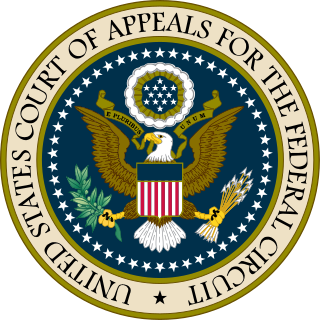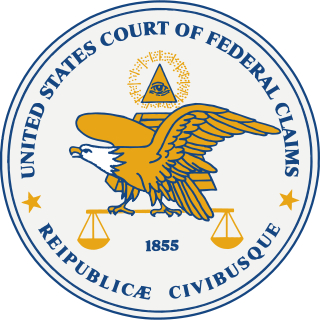Related Research Articles
In the United States, a state court has jurisdiction over disputes with some connection to a U.S. state. State courts handle the vast majority of civil and criminal cases in the United States; the United States federal courts are far smaller in terms of both personnel and caseload, and handle different types of cases.

The United States courts of appeals are the intermediate appellate courts of the United States federal judiciary. The courts of appeals are divided into 11 numbered circuits that cover geographic areas of the United States and hear appeals from the U.S. district courts within their borders, the District of Columbia Circuit, which covers only Washington, D.C., and the Federal Circuit, which hears appeals from federal courts across the United States in cases involving certain specialized areas of law. The courts of appeals also hear appeals from some administrative agency decisions and rulemaking, with by far the largest share of these cases heard by the D.C. Circuit. Appeals from decisions of the courts of appeals can be taken to the U.S. Supreme Court.

The United States district courts are the trial courts of the U.S. federal judiciary. There is one district court for each federal judicial district, which each cover one U.S. state or, in some cases, a portion of a state. Each district court has at least one courthouse, and many districts have more than one. District courts' decisions are appealed to the U.S. court of appeals for the circuit in which they reside, except for certain specialized cases that are appealed to the U.S. Court of Appeals for the Federal Circuit or directly to the U.S. Supreme Court.

The United States Court of Appeals for the Armed Forces is an Article I court that exercises worldwide appellate jurisdiction over members of the United States Armed Forces on active duty and other persons subject to the Uniform Code of Military Justice. The court is composed of five civilian judges appointed for 15-year terms by the president of the United States with the advice and consent of the United States Senate. The court reviews decisions from the intermediate appellate courts of the services: the Army Court of Criminal Appeals, the Navy-Marine Corps Court of Criminal Appeals, the Coast Guard Court of Criminal Appeals, and the Air Force Court of Criminal Appeals.

The United States Court of Appeals for the Federal Circuit is a United States court of appeals that has special appellate jurisdiction over certain types of specialized cases in the U.S. federal court system. It has exclusive appellate jurisdiction over all U.S. federal cases involving patents, trademarks, government contracts, veterans' benefits, public safety officers' benefits, federal employees' benefits, and various other categories. Unlike other federal courts, the Federal Circuit has no jurisdiction over cases involving criminal, bankruptcy, immigration, or U.S. state law.
The federal judiciary of the United States is one of the three branches of the federal government of the United States organized under the United States Constitution and laws of the federal government. The U.S. federal judiciary consists primarily of the U.S. Supreme Court, the U.S. Courts of Appeals, and the U.S. District Courts. It also includes a variety of other lesser federal tribunals.

The United States Tax Court is a federal trial court of record established by Congress under Article I of the U.S. Constitution, section 8 of which provides that the Congress has the power to "constitute Tribunals inferior to the supreme Court". The Tax Court specializes in adjudicating disputes over federal income tax, generally prior to the time at which formal tax assessments are made by the Internal Revenue Service.

The United States Court of Federal Claims is a United States federal court that hears monetary claims against the U.S. government. It was established by statute in 1982 as the United States Claims Court, and took its current name in 1992. The court is the successor to trial division of the United States Court of Claims, which was established in 1855.

The United States District Court for the Eastern District of Missouri is a trial level federal district court based in St. Louis, Missouri, with jurisdiction over fifty counties in the eastern half of Missouri. The court is one of ninety-four district-level courts which make up the first tier of the U.S. federal judicial system. Judges of this court preside over civil and criminal trials on federal matters that originate within the borders of its jurisdiction. It is organized into three divisions, with court held in St. Louis, Hannibal, and Cape Girardeau.
The Civilian Board of Contract Appeals (CBCA) is an Article I court that was established under the Contract Disputes Act of 1978 as an independent tribunal to hear and decide contract disputes between Government contractors and the General Services Administration (GSA) and other civilian Executive agencies of the United States.
The Court of Claims was a federal court that heard claims against the United States government. It was established in 1855, renamed in 1948 to the United States Court of Claims, and abolished in 1982. Then, its jurisdiction was assumed by the newly created United States Court of Appeals for the Federal Circuit and United States Claims Court, which was later renamed the Court of Federal Claims.
Feres v. United States, 340 U.S. 135 (1950), combined three pending federal cases for a hearing in certiorari in which the Supreme Court of the United States held that the United States is not liable under the Federal Tort Claims Act for injuries to members of the armed forces sustained while on active duty and not on furlough and resulting from the negligence of others in the armed forces. The opinion is an extension of the English common-law concept of sovereign immunity.
Merrell Dow Pharmaceuticals Inc. v. Thompson, 478 U.S. 804 (1986), was a United States Supreme Court decision involving the original jurisdiction of the federal district courts under 28 U.S.C. § 1331.
United States v. Utah Construction & Mining Company, 384 U.S. 394 (1966), is a United States Supreme Court case in which the Court held that "(w)hen an administrative agency is acting in a judicial capacity and resolves disputed issues of fact properly before it which the parties have had an adequate opportunity to litigate, the courts have not hesitated to apply res judicata to enforce repose." Utah Construction established a two-part test to determine whether res judicata effect should be given to an administrative determination. First, the agency proceeding must be examined to determine whether the agency was "acting in a judicial capacity" and whether the parties had "an adequate opportunity to litigate" the issues before the agency. Second, the general rules of res judicata must be applied to the case. Not all administrative adjudications, and not all judicial determinations, are entitled to res judicata effect. For the principles of res judicata to apply, administrative determinations, like court judgments, must be valid, final and on the merits.
In government contracting, a Contract Adjustment Board is a department board at the Secretariat level in the U.S. Government that deals with disputes and requests for extraordinary relief under Public Law 85-804 of Aug. 28, 1958.
A changes clause, in government contracting, is a required clause in United States government construction contracts.
The Contract Disputes Act of 1978, which became effective on March 1, 1979, establishes the procedures for handling "claims" relating to United States Federal Government contracts. It is codified, as amended, at 41 U.S.C. §§ 7101–7109.

Price v. United States (1995) was a lawsuit concerning the ownership of certain artwork seized by the United States in Germany in the aftermath of World War II. It was decided by the United States Court of Appeals for the Fifth Circuit, which overturned an initial judgment of the District Court for the Southern District of Texas. The decision was based on the definition of the tort of conversion and the applicability of the principle of sovereign immunity.
The Judge Advocate General's Corps, also known as JAG or JAG Corps, is the military justice branch or specialty of the United States Air Force, Army, Coast Guard, Marine Corps and Navy. Officers serving in the JAG Corps are typically called judge advocates.
The Postal Service Board of Contract Appeals (PSBCA) is a neutral, independent tribunal with the authority to hear and decide any appeal from a decision of a contracting officer of the United States Postal Service (USPS) or the Postal Regulatory Commission related to a contract with either agency. The PSBCA is within the USPS Judicial Officer Department, with the Judicial Officer also serving as the PSBCA Chairman. The PSBCA’s jurisdiction over contract disputes parallels that of the United States Court of Federal Claims with the contractor generally having the option of filing an appeal with either the PSBCA or the court.
References
- 1 2 Michael C. LeMay, The Judicial System: A Reference Handbook (2022), p. 22.
- 1 2 General Accounting Office, The Armed Services Board of Contract Appeals Has Operated Independently , GAO/NSIAD-85-102 (1985), p. 1-2.
- ↑ John W. Whelan, James F. Nagle, Federal Government Contracts: Cases and Materials (2007), p. 14.